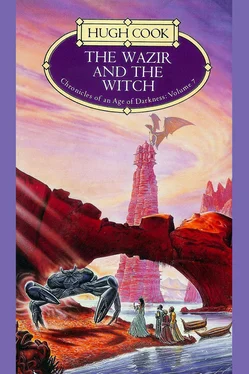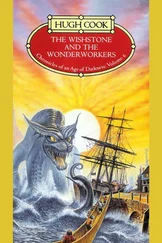Hugh Cook - The Wazir and the Witch
Здесь есть возможность читать онлайн «Hugh Cook - The Wazir and the Witch» весь текст электронной книги совершенно бесплатно (целиком полную версию без сокращений). В некоторых случаях можно слушать аудио, скачать через торрент в формате fb2 и присутствует краткое содержание. Жанр: Фэнтези, на английском языке. Описание произведения, (предисловие) а так же отзывы посетителей доступны на портале библиотеки ЛибКат.
- Название:The Wazir and the Witch
- Автор:
- Жанр:
- Год:неизвестен
- ISBN:нет данных
- Рейтинг книги:5 / 5. Голосов: 1
-
Избранное:Добавить в избранное
- Отзывы:
-
Ваша оценка:
- 100
- 1
- 2
- 3
- 4
- 5
The Wazir and the Witch: краткое содержание, описание и аннотация
Предлагаем к чтению аннотацию, описание, краткое содержание или предисловие (зависит от того, что написал сам автор книги «The Wazir and the Witch»). Если вы не нашли необходимую информацию о книге — напишите в комментариях, мы постараемся отыскать её.
The Wazir and the Witch — читать онлайн бесплатно полную книгу (весь текст) целиком
Ниже представлен текст книги, разбитый по страницам. Система сохранения места последней прочитанной страницы, позволяет с удобством читать онлайн бесплатно книгу «The Wazir and the Witch», без необходимости каждый раз заново искать на чём Вы остановились. Поставьте закладку, и сможете в любой момент перейти на страницу, на которой закончили чтение.
Интервал:
Закладка:
The Empress ascended to the palace roof, meaning to soothe her nerves by swimming in her rooftop pool. But Hostaja Sken-Pitilkin was there, labouring on the rebuilding of his airship, with Jan Rat working alongside him. Justina, loathe to disturb him in this enterprise — that ship might yet save her life, and Sken-Pitilkin seemed seldom in the mood to work on it — quietly withdrew.
Downstairs again, Justina withdrew to her study. When entering that room, she usually gave time to her aquarium. She liked to watch fish: delighted in the grace of the weightless creatures as they drifted through their world of water, peacock their rainbow, dragon their wish. But these days her first concern was always the saucer which sat in spendid isolation above that world, alone on an island inviolate, safe from the depredations of ants and other marauders.
Safe?
‘No!’ said Justina, with bitter disappointment.
There were ants on the egg. Six of them at least. Black flecks of malice, animated appetite devoid of scruples or ethics. They were eating it, surely.
Justina was devastated by this disaster. There was not one single corner of her world which was not threatened by death, horror, pain and pitiless cruelty. This at least she had hoped to salvage, this perfect egg and the miracle within. But she had failed. Even in this she had failed.
Her vision blurred. She squeezed her eyes tight shut. Then fat and hopeless tears began to blubber down her face. Everything in the world was vile, ugly and pitiless, and she did not think she could bear it any longer.
Then Justina calmed herself and, analytically — she had thought the defences she had devised for the egg to be perfect, but obviously she had erred — she began to investigate the scene of the disaster to see what defect in the fortifications the ants had discovered. But her most determined scrutiny failed to find the slightest flaw in the finemesh gauze which guarded the fishtank against invasion.
‘Yet the ants are there,’ said Justina in puzzlement. ‘They are there, are they not?’
She looked closer. No, the flecks were not ants at all. They were merely black flecks.
‘It’s rotten, then,’ said Justina in disgust. ‘It’s gone rotten.’
She displaced the soljamimpambagoya rocks, removed the gauze and retrieved the saucer. Then, overcome by a clinical curiosity, she decided to dissect the egg to see what kind of embryo had died within. She set the saucer down on her desk then rummaged in her cosmetics case, at length retrieving tweezers, a blackhead hook, a pustule needie and a pair of trimming scissors. These she laid out on the desk. Then she pulled up a chair so she could work at leisure in comfort.
The Empress Justina picked up the pustule needle, meaning to lance one of the flecks to release any liquid rot within. Then she stayed her hand. For the egg had changed. The half-dozen flecks had run together to form one ragged patch of darkness. A strangely sudden change! Unless…
Justina peered closely.
‘Well goodness gracious me!’ she said.
The darkness was not a blemish but a hole. A hole into the egg. And within, something was moving. Even as the Empress watched, something yellow and wan snouted out from the egg. A tiny something, so small it was hard to credit its flesh with autonomous existence.
‘My!’ said Justina in wonderment.
It was a dragon. The smallest of all the world’s dragons, and the first of its race to come into the world ab ovo. Its mother had been created ex nihilo by a demon acting on whim, and its mother was missing and possibly dead. Since the breed had demonstrated a capacity for parthenogenetic reproduction, the race might survive if this dragonet could be preserved.
‘But,’ said Justina, ‘as yet the thing is not even out of the egg.’
No. It was not out at all. And its struggles to escape from the egg looked to be as traumatic as the prolonged birth-struggle which so oft initiates a human into the world of women and men. Justina longed to help it, but restrained herself. For the brute instruments of steel laid out upon the desk were of formidable size when compared to a dragon so fragile, and she doubted her hand could sustain the delicacies of surgery which would have been required to assist the thing from its miniature shell.
So Justina watched until at last her dragon was free.
Now it has been said by some commentators that Justina Thrug never denied herself the smallest indulgence: that whatever she wanted to do, she did. But this is not true. She denied herself much and restrained herself often, as did she now. For what Justina truly wanted to do was to have the palace bells rung long and loud to celebrate the dragonbirth, to command parades and festivals and a General Prescription. She wished to rush forth and to cry (as Occasions demanded):
‘Tintinnabulate the tintinnabula!’
To hear bells, yes, and trumpets; to see smiles, yes, and laughter; to have uproar and gaiety, and a death to decorum. But Justina feared her people would think her mad were she to order such ceremonies for the hatching of this babiest of dragons. Furthermore, there was no alternative Occasion which she could reasonably propose as an excuse for an Outbreak. Therefore Justina denied herself pleasure and concentrated on the practicalities.
‘Food,’ said Justina.
Again she had recourse to her cosmetics case. She took some little balls of cotton wool. One she soaked in water and another in goat’s milk, which was fresh-fetched from the kitchen at her command. These cotton wool balls she placed upon the saucer so this tiniest of dragonets could suckle upon them at will. Then she took a corpse maggot (a delicacy also commanded from the kitchen) and chopped it up very finely, and upon the saucer she raised a little pyramid comprising the resulting shreds of this most delicate of meats.
One task alone remained before she returned her charge to its fishbowl sanctuary.
The dragon must be named.
‘I name thee… what? No, not what. You need more of a name than what. Untunchilamon bore thee, hence… Injiltaprajura I name thee.’
Injiltaprajura squirmed upon the blotting paper, which by now had soaked up most of the egg-slish of her hatching. Yet some organic aftermath of birth still clung to the dragon’s transparent scales. As Justina watched, Injiltaprajura opened her jaws, and began to lick herself clean with a tongue more slender than a cat’s whisker.
And Justina smiled, in triumph and in hope for the future.
CHAPTER THIRTY-SIX
It was night on Untunchilamon. The day quarter was undokondra; and, in the dark of that quarter, safe in the fastness of the Temple of Torture, an old man meditated upon the forthcoming delights of the Festival of Light. The old man was Nadalastabstala Banraithanchumun Ek, High Priest of Zoz the Ancestral, and in his imagination he was rehearsing whole catalogues of torture.
Elsewhere, on the rooftop of the pink palace which lorded it over Pokra Ridge, Olivia Qasaba sat as silently as a shadow as she watched the Empress Justina stripped to her nakedness.
‘Well,’ said Justina, smiling at the airship shadows which hid Olivia, ‘aren’t you going to join me?’
‘Maybe later,’ said Olivia.
She was in no mood for disporting herself. She had yet to learn Justina’s knack of leaving her troubles to look after themselves. Besides, Olivia liked neither night nor water. The sun was her element, and she had always been a little afraid of the night.
‘This will do you good,’ said Justina.
‘Thank you,’ said Olivia formally, ‘but no.’
‘Then do you want to go back downstairs and go to bed?’
‘Not just yet,’ said Olivia.
She was frightened by the menacing silence of the palace by night. Everyone who could leave the pink palace had done so in anticipation of some forthcoming disaster. Olivia did not like to be alone in the place.
Читать дальшеИнтервал:
Закладка:
Похожие книги на «The Wazir and the Witch»
Представляем Вашему вниманию похожие книги на «The Wazir and the Witch» списком для выбора. Мы отобрали схожую по названию и смыслу литературу в надежде предоставить читателям больше вариантов отыскать новые, интересные, ещё непрочитанные произведения.
Обсуждение, отзывы о книге «The Wazir and the Witch» и просто собственные мнения читателей. Оставьте ваши комментарии, напишите, что Вы думаете о произведении, его смысле или главных героях. Укажите что конкретно понравилось, а что нет, и почему Вы так считаете.












